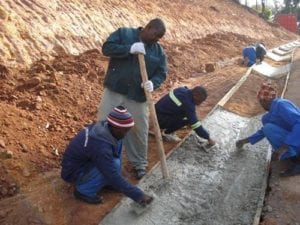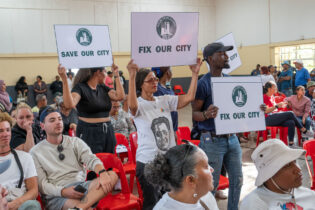Job creation and sustainable enterprise development need to be the foundation of municipal engineering projects in South Africa. This requires municipal engineers and consultants apply innovative, fresh engineering solutions.
Community gardens, agricultural hubs, compost programmes, ablution block management, adventure tourism and various research and development projects– including projects such as vegetable soybean, biowaste, rainwater harvesting, dynamic aquaculture, waste recycling and invasive alien plant eradication. These are not the typical projects municipal engineers would keep themselves busy with. However, in light of expediting service delivery failures, inability to bring effective services to grassroots communities and a growing focus on sustainability, alternative approaches may be the future of municipal engineering in South Africa. “The implication for municipal engineers in South Africa is that we need to change from being engineers with technical skills to becoming ‘engineers for change’. Many of these projects relate to work that engineers never thought they would get involved in – the typical ‘softer’ elements such as social sustainability and agriculture. However, I think the engineering discipline is increasingly realising that it requires alternative design and implementation solutions to bring about impactful change at grassroots level,” says Jannie Pietersen, past president of the Institute of Municipal Engineers of Southern Africa (IMESA). Many municipalities have started to embrace innovative, yet slightly more unconventional ways to improve services such as water and sanitation provision, waste removal and infrastructure management. Pietersen, who also serves as deputy head of engineering at eThekwini Municipality,shares some of the out-of-the-box solutions eThekwini has adopted to improve access to basic services at reduced costs. “The imperative objective and foundation of all these projects, in line with national government’s priorities, is job creation and sustainable enterprise development. A great deal of technical proficiency prevails in the implementation of these projects, but they require a paradigm shift. While traditional technical skills are vital for the municipal engineer, the key issue going forward is the development of non-technical and interpersonal skills. These abilities are measured by communities and are seen as an important indicator of an engineer’s worth. “We need to steer away from ‘hard’ engineering issues and instead use engineering to move towards thestimulation of micro-economies that will act as catalysts for the creation of jobs and local small businesses,” says Pietersen. A focus on job creation– sustainable cornerstone Alternative engineering solutions are based on the premise of social, environmental and economic sustainability. In South Africa, the creation of job opportunities and small medium enterprises (SMEs) remainthe foundation for ensuring our country’s future economic growth.This imperative goes hand in hand with national government’s Extended Public Works Programme (EPWP). At eThekwini, EPWP falls under the municipality’s Infrastructure Management and Socio-Economic Development department,which coordinates all EPWP activities, as per council policy. During the second phase of the EPWP, government introduced an incentive grant to incentivise public bodies to create more work opportunities. To date,eThekwini Municipality has earned a total of R160 million incentive grants due to its performance and in 2012/13 created more than 20 000 work opportunities through projects. According to Pietersen, job creation is part and parcel of the municipality’s development approach and is closely interwoven with the projects it embarks on. Skills to support job creation It is, however, futile to create jobs if the skills pool to support such opportunities does not exist. Training therefore forms an integral part of the job creation process. With this purpose in mind, the Infrastructure Management and Socio-Economic Development department(IMS),through its Training Academy,is running a Contractor Development Programme. It is currently in the process of establishingCETAaccreditation. The municipality also runs the Vuk’uphile Learnership Programme, an initiative between eThekwini, the Department of Public Works, the Construction Seta and Nedbank. The programme aims to develop emerging constrictors and their supervisors into sustainable enterprises that are able to execute labour-intensive projects. The three-year learnership takes learners through a series of classroom and on-site training, with the objective to develop their financial, administrative, technical, contractual, managerial and entrepreneurial skills. Selected candidates have to meet a set of pre-determined criteria. The programme trains the contractor and supervisor in NQF level 4 and the company must achieve a minimum exit rating of CIDB 3. During the process, mentors provide expertise, minimise risk and assess learner progress for the duration of the learnership. The IMS department started this programme in 2005.The Vukuphile I learners have now successfully exited the programme and are workingas contractors within the industry. The Vukuphile II learners (24 contractors and 24 supervisors) are currently completing their on-site training and returned to the classroom in August 2013 to continue with the theory training. IMS is now in the process of recruiting the third intake of Vukuphile II learners. Agricultural hubs and community gardens The IMS department embarked on an Agricultural Zonal Budget Programme, aimed at assisting small farming cooperatives in 103 wards of eThekwini Municipality. The purpose is to provide small farming cooperatives with fencing, access roads, stormwater control, water, sanitation, micro-irrigation, tools, containers, sheds, compost and rural fish ponds, as well as training on garden maintenance. The initiative ties with the Contractor Development Programme as the emerging contractors, as part of their learnership programme, carry out the construction of these gardens. A total of R40 million has been allocated from the Zonal budget to develop the gardens and the municipality established four agricultural hubs to provide agricultural guidance, technical support and training. The first phase of the garden’s infrastructure development has been completed by the emerging contractors and comprise of 27 gardens. The second phase comprises 40 gardens, while the municipality allocated the construction of 15 gardens for the third phase. In some regions, partner farmer Agrihubs have been established to support small-scale growers and emerging farmers in a radius of 15 km. The Agrihubs provide free tuition and mentorship in organic- and intensive farming methods. It further supports the farmers’ enterprises by coordinating discounted seedling supplies and purchasing fresh seasonal and niche vegetables from partner farmers. These are then delivered through a network of niche markets. The project runs in parallel with a compost programme and school garden projects, all executed within the boundaries of the agricultural hubs. Biowaste projects Research and development is paramount to the successful implementation of alternative, more sustainable infrastructure development solutions.eThekwini has embarked on several R&D projects that will provide blueprints for full-scale implementation in the future.The municipality has made specific inroads in terms of biowaste research. One such project forms part of the compost programme operated from the Northdene Research and Development Centre. It comprises a skip, fed with crop residues from a fresh produce market. The skip contains a digester with blower, which decomposes crop residues into compost within a three-week period.
An MSc chemical engineering student from the University of KwaZulu-Natal is developing an enzyme thatcan be used to fast-track the decomposition process. The skip can hold up to 15 m³ of crop residues, which is mixed with wood shavings. Nutrient-rich compost, the end-product,will be transported to the various garden projects. The process of decomposition occurs under aerobic conditions,therefore no methane gas or foul smell is emitted. Theresearch project, under the supervision of Pietersen and John Parkin, deputy head, Plant & Engineering at eThekwini Municipality,forms part of larger research that aims to develop more environmentallyappropriate and socio-economic sustainable biotechnological processes for converting biomass into biogas and organic based fertiliser. Countries such as Denmark, Sweden, Turkey, Malaysia, Ghana, South Africa (eThekwini), Egypt, Italy and Morocco participate in the research. The IMS department is also testing biogas digester technology at rural farms within the municipality’s borders. One objective is to train a local contractor to competently build the 6 m³ biogas digesters with the long-term objective of creating jobs through a biogas rollout. The department will test the two digesters at sites that adhere to the following selection criteria: ownership of livestock and enclosure for the livestock, a water source and active farmers. Ward 4, one of the most impoverished communities within the municipality, adheres to these criteria and has been selected as the test site. The biogas digesters were built according to design, using brick, mortar and a fibreglass dome. Following a one-month preparing period, the research team lit the methane gas, which can be used for cooking. The payback period in relation to the volume of the gas is dependent on the amount of manure inserted as well as the frequency of usage. At a rate of 30 kg of cow dung inserted per day, the payback period would be approximately 6.5 years. Innovative sanitation systems and resource recovery Adjacent to one of the Newlands hub,the IMS department selected a test site for integrated research on sanitation, decentralised wastewater treatment, nutrient recovery and recycling, and agriculture. Three main focus areas form part of the research at the site: various types of sanitation systems, technologies to recover valuable resources from sanitation systems, agricultural use recycling and recovery of resources to the soil. The two sanitation systems being evaluated at the Newlands Research Site include a decentralised wastewater treatment system (DEWATS) and on-site urine diversion dry sanitation toilet systems. DEWATS is designed to treat waterborne sanitation systems with no to lowenergy usage. It has the possibility of energy recovery from methane gas and water with dilute nutrients of nitrogen and phosphorus.Urine diversion dry sanitation toilet systems, on the other hand,are appropriate for areas outside the waterborne edge, where the installation of sanitary sewers is impractical. Urine contains valuable nutrients for recycling to the soil. However, at certain concentrations, these same nutrients are pollutants, causing algal blooms and hypoxic conditions in rivers and waterways, therefore,exerting a burden on sanitation systems to remove them for safe release into the environment. Therefore, sanitation systems can recover valuable resources, and when properly treated and hygienised, these resources can be reused and recycled into agricultural projects. It includes nutrients that are formed into fertilisers, purified water, soil amendments and energy. The main nutrients targeted are phosphorus and nitrogen. Phosphorus (P) supplies are finite, in decline and have no replacement. Phosphorus is essential for growing food and thus relates to concerns about food security. Nitrogen (N) fertilisers are produced by fixing nitrogen gas that is readily available in the atmosphere with electricity and thus require a certain expense for production. Diverted and collected urinefrom on-site urine diversion toilet systems contains high concentrations of phosphorus and nitrogen. The municipality constructed two reactors – a struvite reactor and biological treatment unit – to evaluate the recovery of these nutrients and incorporate it into usable fertilisers. The struvite reactor recovers most of phosphorus present in the urine by adding dissolved magnesium salts, yieldinga phosphorus-rich solid fertiliser. Two options are available: a simple reactor for agricultural sites oran automated, computer-controlled reactor for more densely populated settings. The biological treatment unit works with evaporation and aims to recover the majority of nutrients by using bacteria to convert ammonia-nitrogen to nitrate-nitrogen. The nitrification/evaporation reactor yields a concentrated liquid fertiliser and water. Various agricultural trials are underway at the research site,which involvestesting the DEWATS effluent, struvite fertiliser and LaDePa pellets (pasturised, dried pit latrine contents). The municipality is testing the reaction to a variety of food crops, as well as the nutrient availability in the soil and plant uptake. Although the research focus at the centre is holistic, it leaves certain questions around user satisfaction; operational costs for collection, delivery and maintenance;safety for occupational workers and use of end products.These research projects are under way with partners in South Africa and abroad. Aquaculture In parallel with the roll-out of food gardens into rural eThekwini,the IMS department has commenced with the provision of Mozambique tilapia as an additional food source to substitute protein shortages in diets. As the project progresses, it will also become an economic empowerment initiative. Different aquaculture systems have been designed and tested at Northdene Research & Development Centre, namely a basic recirculating plastic-lined pond (also referred to asthe rural pond), a six-tank system that can be used when minimal space is available (the urban system) and a concrete-based tank system for the grow out of fish(commercial system). “Our initial aim is to construct the basic recirculating rural ponds in selected gardens for food security. The community members at each site are to be trained in basic fish husbandry and pond maintenance. Each pond will be under an agri-tunnel for warmth, which is essential for good growth rates of the fish,” says Pietersen. “When the male fingerling fish reach a size of approximately 400 g, they will be harvested, sold at market and the proceeds given to the community,” he continues. The aquaculture system, and all other projects described in this article, has carefully considered the requirements of transferring skills, creating jobs and stimulating local economies through small enterprises. “At eThekwini municipality,we view this as critical to the sustainability and economic growth of South Africa,” Pietersen concludes.






